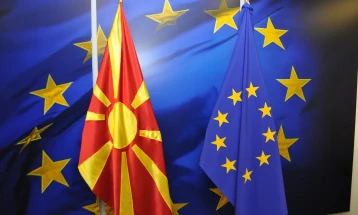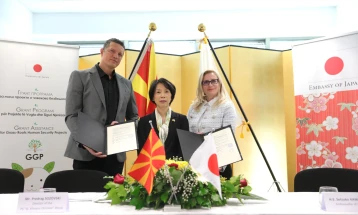UNESCO declares Macedonian bagpipes intangible cultural heritage
- "The traditional making and playing of the bagpipes (gayda)” becomes the sixth intangible cultural property included on UNESCO's Intangible Cultural Heritage of Humanity, officially putting the Macedonian bagpipes on the world cultural map along with the Feast of the Holy Forty Martyrs in Štip, Kopachkata, Glasoechko, and Martinka, Minister of Culture and Tourism Zoran Ljutkov said.Мартинките", соопшти министерот за култура и туризам Зоран Љутков, денеска на прес-конференција заедно со директорката на Управата за заштита на културно наследство Весела Честоева, професорот за народни инструменти од Факултетот за музичка уметност при УКИМ, Драган Даутовски, како и советникот за култура и информации во Амбасадата на Република Турција во земјава, Махир Енес Оздемир.

Skopje, 16 December 2024 (MIA) - "The traditional making and playing of the bagpipes (gayda)” becomes the sixth intangible cultural property included on UNESCO's Intangible Cultural Heritage of Humanity, officially putting the Macedonian bagpipes on the world cultural map along with the Feast of the Holy Forty Martyrs in Štip, Kopachkata, Glasoechko, and Martinka, Minister of Culture and Tourism Zoran Ljutkov announced at a Monday press conference, together with the Director of the Directorate for the Protection of Cultural Heritage, Vesela Chestoeva, the Professor of Folk Instruments at the Faculty of Music Arts-UKIM, Dragan Dautovski, and Counsellor for Culture and Promotion at the Turkish Embassy in North Macedonia, Mahir Enes Özdemir.
Minister Ljutkov said that this year's nomination is multinational, together with the Republic of Türkiye, because our Turkish friends participated with their type of bagpipes called 'tulum.'
"On December 5, the Macedonian bagpipes were officially included in the cultural map, along with the Feast of the Holy Forty Martyrs in Štip, Kopachkata, Glasoechko, and Martinka. This is a very important moment for Macedonian culture, because after a seven-year break, we are again part of UNESCO's big family, which our country has been a part of since 1993. Therefore, I want to highlight that out of the total number of our listed intangible assets two are we share with Türkiye - the cultural practices associated to the 1st of March and the Feast of the Holy Forty Martyrs in Štip, an element included in 2017 and this years' successful nomination of the folk musical instrument- gayda, with which we applied as a multinational nomination alongside with the Republic of Türkiye, as they participated with their type of bagpipes called the 'talum'," Ljutkov explained.

Chestoeva pointed out that the Macedonian bagpipes are included among the representative elements of the world cultural map, such as the Japanese sake, the Hungarian csárdás dance tradition, the Bosnian sevdalinka, the Chinese New Year and other elements that are also this year placed on the representative UNESCO list.
"The Macedonian bagpipes, thanks to several professional musicians of the National Orchestra of the Macedonian Radio and Television and the National Folk Song and Dance Ensemble- Tanec, from the second half of the 19th century onwards, expanded the meaning and skill of playing the Macedonian bagpipes on three continents through international seminars. Today, its relics can be found on American, European, and Australian soil. It became a studio musical instrument, not only used on the folklore musical scene, but also pop, rock, and other genres of music culture. By joining UNESCO, the Macedonian bagpipes gains visibility on the world stage, raises awareness of our Macedonian peculiarity and above all, opens the doors for artistic exchange with a wide range of cultures that have similar musical instruments, which are also included in the World Bagpipe Federation," Chestoeva noted.
According to Enes Özdemir, this achievement does not only mean the promotion of the cultures of the two countries, but also a significant step towards further strengthening the cultural ties that the two countries jointly present to the world.
"This success does not only mean the promotion of the cultures of the two countries, but this nomination also represents a significant step towards further strengthening our cultural ties that we jointly present to the world. The number of Turkish elements inscribed in UNESCO's intangible heritage list amounts to 31, ranking Türkiye second on the list. We continue to work under the 2003 agreement, developed by the Turkish Ministry of Culture and Tourism, which aims to contribute to peace, intercultural dialogue, respect for cultural diversity and fostering mutual understanding of neighbors. Fourteen of the 31 cultural heritage elements are registered as multinational elements, and this is a significant proof of the successful cooperation with the regions with which we share common values,” stated Enes Özdemir. ssh/ba/
Photo/video: MIA











